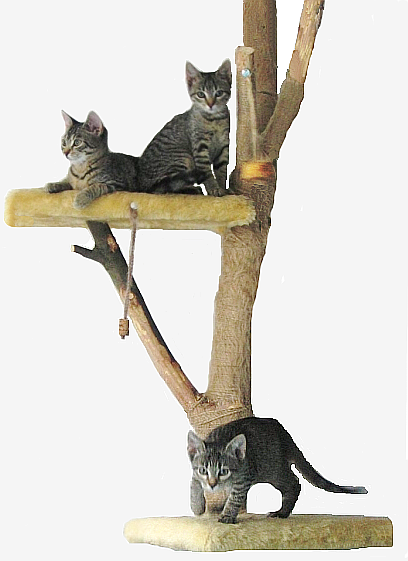Scratch That! Prevention and Management for Destructive Scratching
 Cats are born to scratch. They do this in order to maintain nail health and mark territory, visually and with scent. Nails also aid in helping cats balance, climb and for self-defence. Here are some tips to help you set your cats environment up for successful scratching rather than destructive scratching:
Cats are born to scratch. They do this in order to maintain nail health and mark territory, visually and with scent. Nails also aid in helping cats balance, climb and for self-defence. Here are some tips to help you set your cats environment up for successful scratching rather than destructive scratching:
1. Vertical vs. Horizontal: Is your cat a vertical or horizontal scratcher? Do they prefer the rug or the side of the couch? This is important to know so you can purchase the right alternatives for them such as corrugated cardboard scratcher and scratching posts. Both these items come in horizontal and vertical options.
2. Scratching Equipment: Place the scratching equipment you want your cat to use near the area they are scratching.
3. Scratcher Appeal: Adding some honeysuckle spray or cat nip can help keep your cat attracted to the area. Feliscratch is a product that can be purchased, usually through your veterinary clinic, this is a product designed to encourage your cat to scratch the desired surface. This can also be paired with Feliway which is a synthetic territorial pheromone that can be sprayed on surfaces you don’t want your cat to scratch.
4. Soft Paws: Soft paws are covers for your cat’s nail that can help manage destructive scratching. These can be purchased by your veterinarian or pet store. Ensure when using them for the first time you are using lots of treats while putting them on for your cat to make a positive association with the procedure. If you have difficulty using soft paws your veterinary clinic staff will be happy to assist.
5. Punishment Should be Avoided: Spray bottles, yelling and/or hitting is not an appropriate solution to manage destructive scratching. These forms of punishment teach cats that you are scary and increases their fear and anxiety. Punishment also does not teach them what they are supposed to do.
6. Tension Among Cats: In multi-cat households where there can be competition for resources such as feeding stations, litter boxes and sleeping area you can see an increase in territorial scratching due to tension among cats. Each cat should have their own separate area for feeding, sleeping and bathroom breaks to avoid undue stress and decrease destructive scratching.
7. Environmental Enrichment: Ensure your cat’s environment is enriched with food puzzle toys, elevated surfaces, hiding spaces and toys. This is important for your cat’s overall health and well-being.
8. Management: Managing the space may need to be consider. If you have tried the above recommendations and your cat is persistently scratching the same area blocking access to the area may be required.
9. A word on declawing: The Canadian Veterinary Medical Association finds declawing unethical, as it has lasting behavioural and physical effects on cats.
10. Find a Professional: If you need help with your cat’s scratching behaviour, speak to your veterinary team or contact a trainer that is specialized in feline behaviour.
Destructive scratching can be troublesome and frustrating. Please ensure your cat has outlets for their natural scratching behaviour. An enriched environment and a positive bond with you and this undesirable behaviour can be easily modified with the above recommendations.
By: Jessica Benoit RVT, CPDT-KA, Fear Free Certified Trainer
Companion Veterinary Clinic
